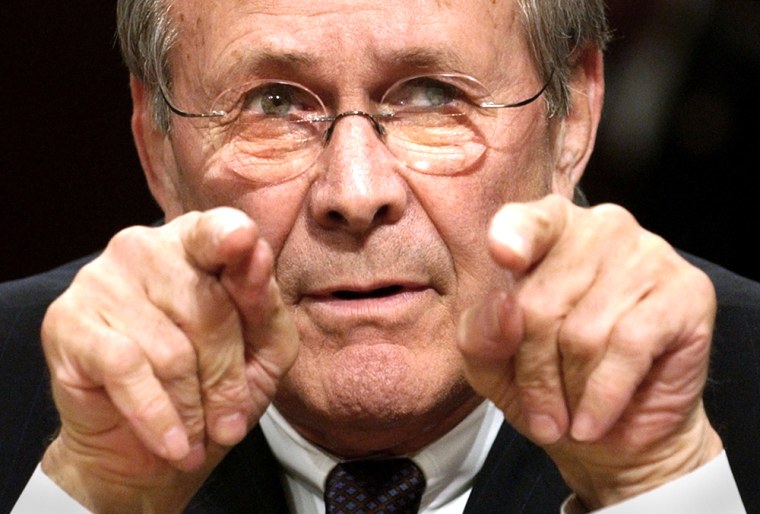Defense Secretary Donald H. Rumsfeld insisted Sunday that Iraq was not a distraction for the Bush administration in the days before and after the Sept. 11 attacks.
Rumsfeld sought to counter the contention of President Bush’s former chief counterterrorism adviser, Richard Clarke, who testified last week that the administration was preoccupied with Iraq and ignored the threat posed by Osama bin Laden and his al-Qaida terrorist network.
“If one looks at what was done, we went to Afghanistan, we didn’t go to Iraq,” Rumsfeld told ABC’s “This Week.”
“It was a highly successful effort and it did not destroy al-Qaida. But it certainly took away their training, their haven, and it certainly destroyed the Taliban and eliminated them from running that country. That’s what the president’s action was. It wasn’t Iraq. It was Afghanistan.”
Asked if Bush should apologize to the Sept. 11 families for the government’s failure to prevent the attacks, Rumsfeld said the president has made clear his sorrow.
“I think the president has recognized the failure that existed and the concern he has for those people and the fact that the government, our government, was there and that attack took place. I don’t know quite what else one would do,” the defense secretary said on “Fox News Sunday.”
In public hearings last week to an independent commission investigating the attacks, Clarke apologized to the families of Sept. 11 victims. He said their government failed them and he did, too.
Rumsfeld said the commission’s review should look forward and identify actions the administration should be taking to prevent future attacks.
“Now, the question is, what do you do about it, going forward? And it seems to me that the task now is to say, what ought we to be doing today so that the next attack does not happen,” Rumsfeld said. “There’s no question there will be attempts for additional attacks.”
The reality, Rumsfeld said, “is that terrorists can attack any time at any minute, 24 hours a day, using a variety of techniques, in any place at all.”
White House counterattack
The administration began a furious counterattack after Clarke’s testimony, which came a day after his tell-all book critical of Bush went on sale.
Rumsfeld contended that he has been quoted by Clarke as saying things in a Sept. 4 meeting that the Pentagon chief did not attend.
“It’s hard for me to explain a person who would characterize a conversation in a meeting that I was not even in the room, or the building when it supposedly took place,” Rumsfeld said.
National security adviser Condoleezza Rice, who has declined to appear publicly before the commission, has sharply criticized Clarke. She has said Clarke praised Bush’s anti-terror efforts while working for the president, but then began telling a different story after leaving his post and writing his book.
Rice has met privately with the Sept. 11 commission to answer questions, and the White House has offered to let her meet with the panel for a second time behind closed doors to clear up “mischaracterizations” of her statements and positions.
Rice was to be interviewed on CBS’ “60 Minutes” on Sunday night, a week after Clarke discussed his book on the program.
